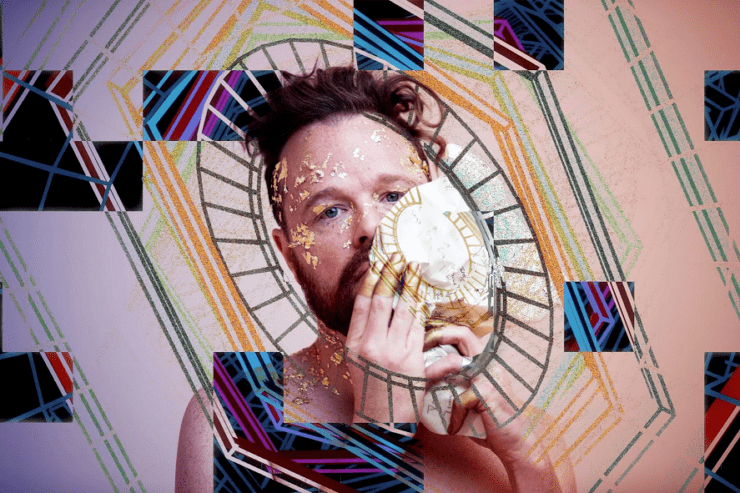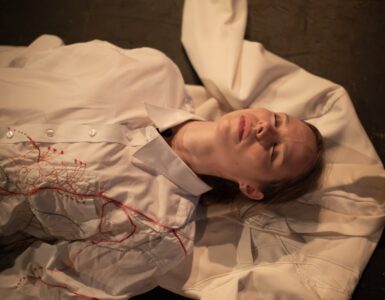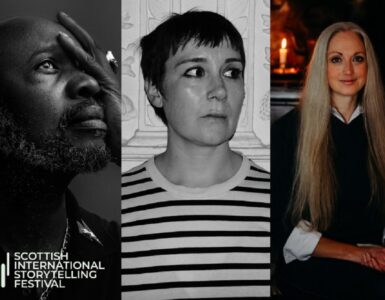Today we’re joined for a pixelated pint by Larkhall, the piano virtuoso behind Say You’re With Me – Piano and Creative Coding – making algorithms art and coding creative at Summerhall’s Red Lecture Theatre this coming August. So what makes coding creative and how do we blend music, composition with the digital world? Let’s find out!
Jake: Your show is bringing compositions and visual art about algorithms to life this Fringe. You’re hoping to show how STEM subjects can be applied outside of a “traditional engineering context” – can you shine a bit of light on that for us?
Larkhall: Code is everywhere these days— we’re constantly swimming in a sea of algorithmic social media feeds, driving directions, weather forecasts, product recommendations. And while I think people are generally aware of (and sometimes alarmed by) this, people don’t necessarily have a lot of ways to appreciate the creative side of algorithms: how they can create beauty or be a tool for expression.
For my show Say You’re With Me, I’ve developed a system of computer algorithms that can listen to what I play and not just react to the raw sound, but understand the musical meaning behind it. And then for each piece there’s a different set of live visuals that are generated in real time based on that specific, exact performance. So it’s different each time— some of the differences are subtle and other times it’s quite obviously different. But if I play faster, or softer, or I play a wrong note— it’s all translated into the visuals.
I have a dual background in that I’ve worked professionally as a pianist and as a software developer. So I have some insight into how these two worlds work. There’s been a big push for years now to get kids excited about STEM careers— some of that is laudable; we do for example have a shortage of doctors here in the UK. And a lot of STEM careers are wonderfully stable compared with a career in the arts. But some of the STEM focus feels like it’s presented almost in opposition to a “creative” career, when in fact I see the two as complimentary.
To give one example, music and code are both ways of organising complexity. And through learning complex pieces of piano music I’ve developed my ability to chunk pieces of information together in my head in order to manage more of it than I’d otherwise be able to keep in my working memory. And that comes in handy when I’m coding— you can’t keep the entirety of an app or algorithm in your head at once, so you’re constantly packing and unpacking bits of abstraction so that you can create a mental model of what you’re working on and how it fits into the whole project. It’s extremely common for professional software folks to play music at a high level— so I don’t think it’s just me that’s figured out this connection. Aside from that though, computers, algorithms and software are incredible tools for creativity. There’s a massive ecosystem of tools, open-source projects, and tutorials for anyone to get started. And some people who do this might go on and work as software developers, but I don’t see that as the ultimate goal— this is a relatively new way for people to be creative, and that’s important in itself.
Jake: What process have you taken to turn the complex, maybe a little inaccessible and quite scientific topic of algorithms into music and visual art?
Larkhall: When I first started making the show I wanted the visuals to just happen, like magic— my idea was that you wouldn’t see anything except me, the piano, and the visuals. But as I developed it more I realised that this actually got in the way of people’s enjoyment and understanding of what was going on.
There’s a principle in design called “honesty of materials” which is like, if you build something out of aluminum, it should look like aluminum. If it’s plastic, it should look like plastic, it shouldn’t be “fake wood”.
I think about this a lot as it relates to my practice, and this is part of why I decided to change the show so that the computer that runs my algorithms is onstage, almost like a second performer. I’ve decided to name it— Otto— and since he’s got an active part to play in the show it feels… honest and helpful to have him onstage with me where people can see what he’s doing.
The other part of this is the question: What are the algorithms actually doing? There’s one module that’s listening to what I’m playing and comparing it to, essentially, a machine-readable version of the score for that piece. And that module can follow along as I play, and it knows which notes are, for example, melody versus harmony. Or when a section change happens. And then for each piece there’s a “visuals” module that knows how to create the live projections for the exact way that I’m playing the piece on that particular day.
I’m inspired greatly by the natural world, and I use a lot of nature imagery in my work. There’s also a lot of geometry and particles— juxtaposing those gives me a really fulfilling sense of merging nature and technology.
Jake: Now that we’re gearing up for Fringe season, what are you most excited for?
Larkhall: God, I’m so excited to actually be up in Edinburgh performing! Developing a show is amazing but as a solo artist it can be a bit lonely work at times. And there’s just this insane amount of prep, logistics, promotion— I think most artists are on some level terrified no one will turn up, no matter how much buzz they’re getting— so it’s going to be really great to actually arrive, load in, tech the show and do that first preview performance.
I’m equally excited to see the nine zillion other amazing shows at the Fringe— I got my copy of the Summerhall brochure and I pretty much want to see everything. The full programme is on its way and I’m going to go wild for that too, I’m sure. It’s just such a concentration of awesomeness.
Jake: Now, in keeping with the themes of our magazine, if your show was an alcoholic beverage what would it be?
Larkhall: Something like a Hakushu Old Fashioned— a combo of the classic and the new.
Jake: And is there anywhere we can get a sneak preview of what we might hear at the Fringe this year?
Larkhall: The show is paired with a new album— also called Say You’re With Me— which comes out 24 June. It’s available wherever you get your music! I’ll be touring to support the album in June/July, so there’s a chance to sneak-preview some of the material before the fringe.
You can catch Larkhall’s show, Say You’re With Me, at Summerhall’s Red Lecture Theatre August 16th-21st and then again between the 23rd-28th. Tickets are available through the EdFringe Box Office.









